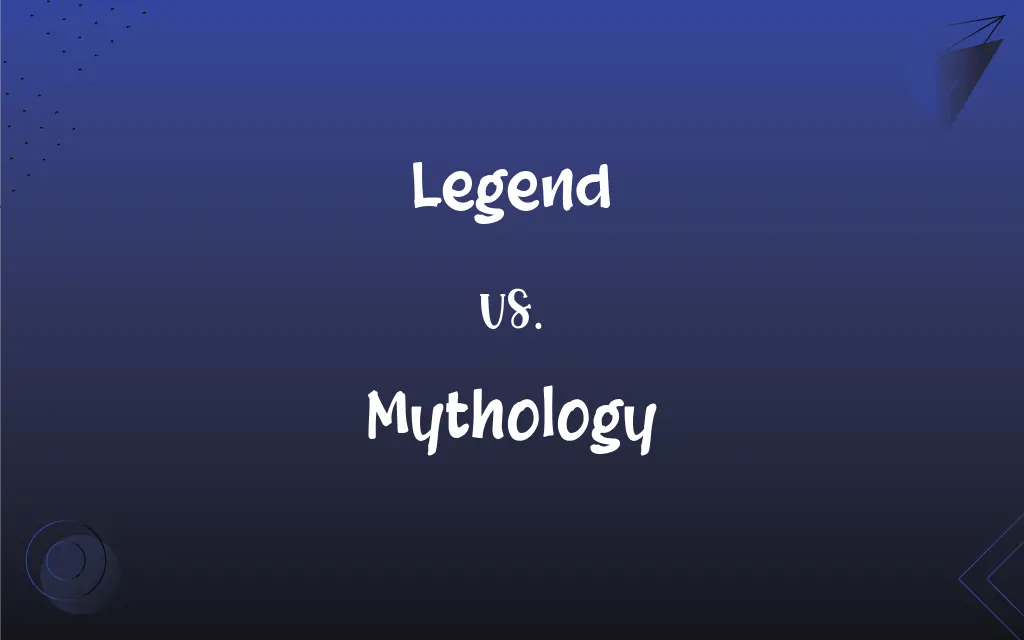Legend vs. Mythology: What's the Difference?
Edited by Aimie Carlson || By Janet White || Published on October 26, 2023
"Legend" refers to a traditional story sometimes popularly regarded as historical but unauthenticated, often involving heroic figures. "Mythology" is a collection of myths, especially those belonging to a particular religious or cultural tradition.

Key Differences
"Legend" is often a story that is handed down through generations and is popularly considered to be based on historical events. These stories typically involve real places and sometimes real people, albeit often with exaggerated deeds or characteristics. "Mythology," on the other hand, is a body of myths that often explain natural phenomena, customs, traditions, and historical events in a metaphorical manner.
"Legend" usually focuses on individual stories, each with their own heroes, settings, and plots. These stories can stand alone and are often told for entertainment or moral instruction. "Mythology," in contrast, is more systemic and organized, comprising multiple stories that often share gods, creatures, and themes, usually forming a coherent system of beliefs or cultural understanding.
While "Legend" might involve elements of the supernatural, it is often grounded in a semblance of historical accuracy, or at least plausibility. "Mythology" freely involves gods, goddesses, and other supernatural beings and often serves to explain the unexplainable, like the creation of the world.
Both "Legend" and "Mythology" play crucial roles in shaping the culture, traditions, and even the moral fabric of societies. "Legend" often serves as localized folklore that reflects and shapes a community's identity. "Mythology" can serve a similar purpose but often on a larger scale, sometimes shaping the worldview of entire civilizations.
"Legend" stories are often subject to change and can vary between communities, reflecting localized beliefs or incidents. "Mythology," although it can have different versions, is generally more rigid and forms a structured belief system that is often recorded in sacred texts.
ADVERTISEMENT
Comparison Chart
Nature
Individual Stories
Collection of Myths
Historical Accuracy
Sometimes, but not authenticated
Generally not
Purpose
Entertainment, Moral Lessons
Explanation of the world
Supernatural Elements
Possible
Common
Cultural Scale
Localized
Often Wider
ADVERTISEMENT
Legend and Mythology Definitions
Legend
A person who has become famous for their skill in a particular field.
Michael Jordan is a basketball legend.
Mythology
A set of stories or beliefs about a subject.
There's a popular mythology about success in America.
Legend
A very well-known, exaggerated story or myth.
The fountain of youth is a legend that persists today.
Mythology
A collection of myths from a particular culture or religion.
Greek mythology features gods like Zeus and Athena.
Legend
An unverified story handed down from earlier times, especially one popularly believed to be historical.
Mythology
The study of myths.
She has a degree in mythology and ancient civilizations.
Legend
A body or collection of such stories.
Mythology
Traditional stories of gods, kings, and heroes.
Norse mythology includes gods like Odin and Thor.
Legend
See urban legend.
Mythology
A fiction or half-truth, especially one that forms part of an ideology.
The mythology of overnight success ignores years of hard work.
Legend
One that inspires legends or achieves legendary fame
She is a legend in her own time.
Mythology
A body or collection of myths belonging to a people and addressing their origin, history, deities, ancestors, and heroes.
Legend
An inscription or title on an object, such as a coin.
Mythology
A body of myths associated with an event, individual, or institution
"A new mythology, essential to the ... American funeral rite, has grown up" (Jessica Mitford).
Legend
An explanatory caption accompanying an illustration.
Mythology
The field of scholarship dealing with the systematic collection and study of myths.
Legend
An explanatory table or list of the symbols appearing on a map or chart.
Mythology
The collection of myths of a people, concerning the origin of the people, history, deities, ancestors and heroes.
Legend
An unrealistic story depicting past events.
Mythology
A similar body of myths concerning an event, person or institution.
Legend
A story of unknown origin describing plausible but extraordinary past events.
The legend of Troy was discovered to have a historical basis.
Mythology
Pervasive elements of a fictional universe that resemble a mythological universe.
Legend
A plausible story set in the historical past, but whose historicity is uncertain.
The legend of Robin Hood
Mythology
(uncountable) The systematic collection and study of myths.
Legend
A story in which a kernel of truth is embellished to an unlikely degree.
The 1984 Rose Bowl prank has spawned many legends. Here's the real story.
Mythology
The science which treats of myths; a treatise on myths.
Legend
A fabricated backstory for a spy, with associated documents and records.
According to his legend, he once worked for the Red Cross, spreading humanitarian aid in Africa.
Mythology
A body of myths; esp., the collective myths which describe the gods of a heathen people; as, the mythology of the Greeks.
Legend
A person related to a legend or legends.
Mythology
Myths collectively; the body of stories associated with a culture or institution or person
Legend
A leading protagonist in a historical legend.
Achilles is a legend in Greek culture.
Mythology
The study of myths
Legend
A person with legend-like qualities, such as extraordinary accomplishment.
Michael Jordan stands as a legend in basketball.
Legend
A key to the symbols and color codes on a map, chart, etc.
According to the legend on the map, that building is a school.
Legend
An inscription, motto, or title, especially one surrounding the field in a medal or coin, or placed upon a heraldic shield or beneath an engraving or illustration.
Legend
A musical composition set to a poetical story.
Legend
(naval) The design and specification of a vessel.
Legend
To tell or narrate; to recount.
Legend
That which is appointed to be read; especially, a chronicle or register of the lives of saints, formerly read at matins, and in the refectories of religious houses.
Legend
A story respecting saints; especially, one of a marvelous nature.
Legend
Any wonderful story coming down from the past, but not verifiable by historical record; a myth; a fable.
And in this legend all that glorious deed Read, whilst you arm you.
Legend
An inscription, motto, or title, esp. one surrounding the field in a medal or coin, or placed upon an heraldic shield or beneath an engraving or illustration.
Legend
To tell or narrate, as a legend.
Legend
A story about mythical or supernatural beings or events
Legend
Brief description accompanying an illustration
Legend
A traditional story considered historical but not verified.
The legend of King Arthur has fascinated people for centuries.
Legend
A guide or key explaining symbols on a map or chart.
Check the legend to understand the map's markings.
FAQs
What is a Legend?
A Legend is a traditional story, often considered historical but not verified.
Do Legends contain supernatural elements?
They can, but not always. Legends often have a semblance of historical accuracy.
What is Mythology?
Mythology is a collection of myths belonging to a particular culture or religious tradition.
Can Legends change over time?
Yes, Legends can evolve and differ between communities.
Do Legends claim to be historical?
They often do, although they are not authenticated.
Are gods common in Mythology?
Yes, gods and supernatural beings are common features in Mythology.
Does Mythology explain natural phenomena?
Often, it aims to explain the natural world, customs, and traditions.
Is Mythology academic?
It can be; it's a subject that people study, involving interpretation and analysis.
Is Legend localized?
Often, Legends reflect and shape local or community identities.
Can Legend also mean a famous person?
Yes, it can refer to someone who is renowned for their skill in a particular field.
Can Mythology mean a set of false beliefs?
Yes, it can refer to an unfounded or false collective belief.
Is Mythology rigid?
Generally, it forms a more structured belief system, often recorded in sacred texts.
Is Legend often entertaining?
Yes, Legends are often told for entertainment or moral instruction.
Does Mythology have a wider cultural scale?
Yes, it often shapes the worldview of entire civilizations.
Are Legends more prevalent in certain cultures?
Legends exist in all cultures but may be more prominent or widely told in some.
About Author
Written by
Janet WhiteJanet White has been an esteemed writer and blogger for Difference Wiki. Holding a Master's degree in Science and Medical Journalism from the prestigious Boston University, she has consistently demonstrated her expertise and passion for her field. When she's not immersed in her work, Janet relishes her time exercising, delving into a good book, and cherishing moments with friends and family.
Edited by
Aimie CarlsonAimie Carlson, holding a master's degree in English literature, is a fervent English language enthusiast. She lends her writing talents to Difference Wiki, a prominent website that specializes in comparisons, offering readers insightful analyses that both captivate and inform.































































